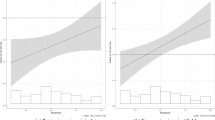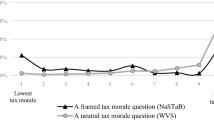Abstract
The study examined citizens' fairness evaluation of the consumption tax recently introduced in Japan, and explored the underlying criteria and their relative importance in judging the fairness of the tax and the procedural fairness by which the tax was introduced. Five dimensions were obtained in factor analysis. Multiple regression analysis revealed that three dimensions contributed to total fairness of the tax: Procedural Fairness, Outcome Evaluation, and Affective Responses. Further analyses revealed that “ramming the bill,” “sufficient discussion,’ and “reflection of citizens' opinions” were crucial for Japanese citizens judgment of procedural fairness. The results supported Leventhal's theory: ethicality, accuracy, and correctability were important.
Similar content being viewed by others
References
Alexander, S., and Ruderman, M. (1987). The role of procedural and distributive justice in organizational behavior.Soc. Justice Res. 1: 117–198.
Barrett-Howard, E., and Tyler, T. R. (1986). Procedural justice as a criterion in allocation decisions.J. Pers. Soc. Psychol. 50: 296–304.
Berkowitz, L., and Walster, E. (eds.), (1976). Equity Theory: Toward a general theory of social interaction.Advances in Experimental Social Psychology, Vol. 9, Academic Press, New York.
Bies, R. J., and Moag, J. S. (1986). Interactional justice: Communications criteria of fairness. In Lewicki, R., Bazerman, M., and Sheppard, B. (eds.),Research on Negotiation in Organizations, Vol. 1, JAl Press, Greenwich, CT, pp. 43–55.
Folger, R. (1977). Distributive and procedural justice: Combination impact of “voice” and improvement.J. Pers. Soc. Psychol. 35: 108–119.
Folger, R. (1986a). Rethinking equity theory: A referent cognitions model. In Bierhoff, H. W., Cohen, R. L., and Greenberg, J. (eds.),Justice in Social Relations, Plenum Press, New York, pp. 145–164.
Folger, R. (1986b). A referent cognitions theory of relative deprivation. In Olson, J. M., Herman, C. P., and Zanna, M. P. (eds.),Relative Deprivation and Social Comparison: The Ontario Symposium, Vol. 4, Erlbaum, Hillsdale, NJ, pp. 33–55.
Folger, R. (1986c). Mediation, arbitration, and the psychology of procedural justice. In Lewick, R., Bazerman, M., and Sheppard, B. (eds.),Research on Negotiation in Organizations, Vol. 1, JAI Press, Greenwich, CT, pp. 57–79.
Folger, R. (1987). Reformulating the preconditions of resentment: A referent cognitions model. In Masters, J. C., and Smith, W. P. (eds.),Social Comparison, Social Justice, and Relative Deprivation: Theoretical, Empirical, and Policy Perspectives, Erlbaum, Hillsdale, NJ, pp. 183–215.
Greenberg, J. (1982). Approaching equity and avoiding inequity in groups and organizations. In Greenberg, J. and Cohen, R. L. (eds.),Equity and Justice in Social Behavior, Academic Press, New York, pp. 389–435.
Greenberg, J. (1986). The distributive justice of organizational performance appraisals. In Bierhoff, H. W., Cohen, R. L., and Greenberg, J. (eds.),Justice in Social Relations, Plenum Press, New York, pp. 337–352.
Greenberg, J. (1987). Using diaries to promote procedural justice in performance appraisals.Soc. Justice Res. 1: 219–234.
Greenberg, J., and Cohen, R. L. (1982). Why justice? Normative and Instrumental Interpretations. In Greenberg, J., and Cohen, R. L. (eds.),Equity and Justice in Social Behavior, Academic Press, New York, pp. 437–469.
Greenberg, J., and Folger, R. (1983). Procedural justice, participation, and the fair process effect in groups and organizations. In Paulus, P. (Ed.),Basic Group Process, Springer-Verlag, New York, pp. 235–256.
LaTour, S. (1978). Determinants of participant and observer satisfaction with adversary and inquisitional modes of adjudication.J. Pers. Soc. Psychol. 36: 1531–1545.
Leventhal, G. S. (1980). What should be done with equity theory? New approaches to the study of fairness in social relationships. In Gergen, K., Greenberg, M., and Willis, R. (eds.),Social Exchange: Advances in Theory and Research, Plenum Press, New York, pp. 27–55.
Leventhal, G. S., Karuza, J., and Fry, W. R. (1980). Beyond fairness: A theory of allocation preferences. In Mlkula, G. (ed.),Justice and Social Interaction, Hauber, Bern, Switzerland, pp. 167–218.
Lind, E. A., Kurtz, S., Musante, L., Walker, L., & Thibaut, J. W. (1980). Procedure and outcome effects on reactions to adjudicated resolution of conflicts of interests.J. Pers. Soc. Psychol. 39: 643–653.
Lind, E. A., Lissak, R. I., and Conlon, D. E. (1983). Decision control and process control effects on procedural fairness judgments.J. Appl. Soc. Psychol. 13: 338–350.
Lind, E. A., and Lissak, R. I. (1985). Apparent impropriety and procedural fairness judgments.J. Exp. Soc. Psychol. 21: 19–29.
Lind, E. A., and Tyler, T. R. (1988).The Social Psychology of Procedural Justice, Plenum Press, New York.
Mikula, G. (1980). On the role of justice in allocation decisions. In Milula, G. (ed.),Justice and Social Interaction, Huber, Bern, Switzerland, pp. 127–161.
Rasinski, K. A. (1987). What's fair is fair—or is it? Value differences underlying public views about social justice.J. Pers. Soc. Psychol. 53: 201–211.
Rasinski, K. A., and Tyler, T. R. (1988). Fairness and vote choice in the 1986 Presidential election.Am. Polit. Quart. 16: 5–24.
Reis, H. T. (1984). The multidimensionality of justice. In Folger, R. (ed.),The Sense of Injustice, Plenum Press, New York, pp. 25–61.
Reis, H. T. (1986). Levels of interest in the study of interpersonal justice. In Bierhoff, H. W., Cohen, R. L., and Greenberg, J. (eds.),Justice in Social Relations, Plenum Press, New York, pp. 187–210.
Takenishi (Minami), A. (1988, November). Effects of voice given by the self-interested allocator. Paper presented at the 100th meeting of the Kansai Psychological Association. (in Japanese).
Thibaut, J., and Walker, L. (1975).Procedural Justice: A Psychological Analysis, Erlbaum, Hillsdale NJ.
Tyler, T. R. (1984a). The role of perceived injustice in defendants' evaluations of their courtroom experience.Law Soc. Rev. 18: 51–74.
Tyler, T. R. (1984b). Justice in the political arena. In Folger, R. (ed.),The Sense of Injustice, Plenum Press, New York, pp. 189–225.
Tyler, T. R. (1985). The psychology of leadership evaluation. In Bierhoff, H. W., Cohen, R. L., and Greenberg, J. (eds.),Justice in Social Relations, Plenum Press, New York, pp. 187–210.
Tyler, T. R. (1986a). Justice and leadership endorsement. In Lau, R. R. and Sears, D. O. (eds.),Political Cognition, Erlbaum, Hillsdale, NJ, pp. 257–278.
Tyler, T. R. (1986b). When does procedural justice matter in organizational settings? In Lewicki, R., Bazerman, M., and Sheppard, B. (eds),Research on Negotiation in Organizations, Vol. 1, JAI Press, Greenwich, CT, pp. 7–23.
Tyler, T. R. (1987). Conditions leading to value expressive effects in judgments of procedural justice: A test of four models.J. Pers. Soc. Psychol. 52: 333–344.
Tyler, T. R., and Caine, A. (1981). The influence of outcomes and procedures on satisfaction with formal leaders.J. Pers. Soc. Psychol. 41: 642–655.
Tyler, T. R., Rasinski, K. A., and McGraw, K. (1985). The influence of perceived injustice on support for political authorities.J. Appl. Soc. Psychol. 15: 700–725.
Tyler, T. R., Rasinski, K. A., and Spodick, N. (1985). The influence of voice on satisfaction with leaders: Exploring the meaning of process control.J. Pers. Soc. Psychol. 48: 72–81.
Author information
Authors and Affiliations
Rights and permissions
About this article
Cite this article
Takenishi, M., Takenishi, A. Why Japanese citizens evaluate the new indirect tax as unfair: Fairness criteria and their relative importance. Soc Just Res 4, 251–263 (1990). https://doi.org/10.1007/BF01048400
Issue Date:
DOI: https://doi.org/10.1007/BF01048400




